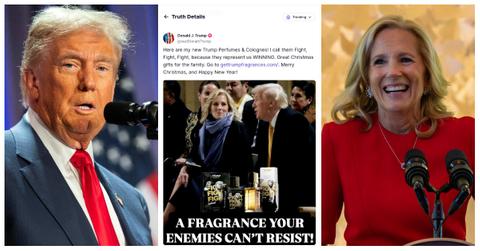Donald Trump Uses Picture With Jill Biden to Sell Cologne — Is That Even Legal?
Donald Trump used an image of himself with First Lady Dr. Jill Biden to push his fragrance brand, raising eyebrows.
Published Dec. 12 2024, 1:04 p.m. ET
When it comes to former and president-elect Donald Trump, ethical conflicts of interest are nothing new. But a new plug by the President-elect is raising some eyebrows. Because it involves the wife of current president Joe Biden.
First Lady Dr. Jill Biden was featured in an ad Trump's team generated, and it is raising questions about conflict of interest and ethical concerns as Trump inches closer to retaking his place in the White House. Here's what we know about the cologne and perfume ads, whether or not they're even legal, and why Trump keeps sparking these ethical concerns.
Donald Trump is selling a cologne using the image of First Lady Jill Biden.
Dr. Biden and Trump both attended the re-opening of the Cathedral of Notre Dame in mid-December 2024. They sat together amidst a sea of international leaders and seemed to be getting along. In one image captured of the two, Dr. Biden appears to be smiling at Trump, who is leaning close and speaking.
Trump's team quickly capitalized on the image, creating an ad for his perfume and cologne brand using the juxtaposition of the duo.
The ad, which is captioned, "A fragrance your enemies can't resist!" immediately raised eyebrows. Many have called it crass and rude, especially considering that Dr. Biden seemed to be friendly with the president-elect and may have been blind-sided by her image being used to promote his product. But was it legal?
According to experts, it most likely was not legal. Dr. Biden may well have a legal case under the law governing her right to protect her image under "right of publicity" laws. Yet Trump could then turn around and defend his team's actions using the First Amendment, which guarantees free speech. It's a complex trail of interconnected laws and rights, so who would come out on top in a potential court case is unclear.
Trump's ethical conflicts are nothing new.
Of course, Trump trodding on ethical concerns and conflicts of interest is nothing new. When he first came to office in 2016 as the president, Trump vowed to divest himself of business interests to avoid the appearance of using public office for personal gain.
Yet some reports suggest that he may have made as much as $160 million from foreign governments while serving in his capacity as President.
If true, it may be a serious ethical concern and conflict of interest.
The Code of Federal Regulations which governs public servants in the United States reads in part, "An employee may not use their public office for their own private gain; for the endorsement of any product, service, or enterprise."
While Trump was only the president-elect while pushing his fragrance, his propensity for pushing merch is well known.
To use a public office for personal gain is considered endangering the country because it places personal interests over the public welfare of the country.
People look to garner favor and advantages, and if a president's favor can be bought through monetary means or other like favors such as buying their product or staying at their hotel property, for instance, it means the president may not be making decisions that are best for the country but are rather best for their own pocketbook.
Trump countered these concerns in his first term by refusing to take a salary. But if reports about the money he earned in office are true, he gained far more financially as president than he lost by turning down the salary.
With his second term looming, Trump's businesses, including his perfume, will be under scrutiny by ethics watchdog committees once again.

